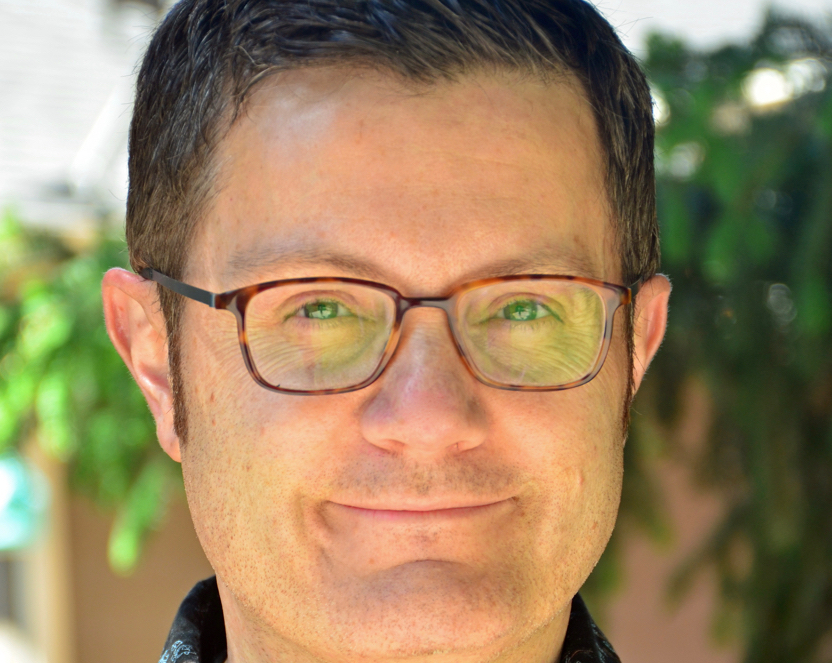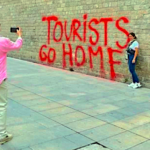Dave Seminara is a journalist and former diplomat based in Bend, Oregon. He is the author of Bed, Breakfast & Drunken Threats: Dispatches from the Margins of Europe, which was a #1 bestseller in Liechtenstein. Dave writes a series for BBC Travel called Travel Pioneers, which won a Lowell Thomas Travel Journalism award in 2016. He is a frequent contributor to The New York Times, and his work has also appeared in The Wall Street Journal, Chicago Magazine, Outside, Espn.com, The Boston Globe, The Chicago Tribune, The Washington Post, and many other websites and publications.
How did you get started traveling?
Family vacations. My first trip was a cruise when I was six months old. The seas were rough and I’m told that my dad dipped my pacifier in his brandy to keep me calm. Apparently I was one of the few people on the boat who didn’t get seasick.
I have five older brothers and when you come from a family of this size, you’re part of a peculiar tribe that has its own custom, rituals, jokes. Most of our family holidays were road trips because who could afford eight airplane tickets? Space was apportioned inside our maroon Ford Country Squire station wagon by the vinyl lines in the upholstered bench seats. He’s over my line! someone would inevitably cry out, prompting parental intervention. Backseat fisticuffs were not uncommon.
My mom packed sandwiches and packets of Tang to avoid the expense of dining out, and all eight of us would somehow cram into one motel room. My dad would park surreptitiously so they wouldn’t see how many of us were in the car and try to charge us extra or insist that we buy two rooms. I loved it.
How did you get started writing?
My first career ambition was to join the Foreign Service, and I achieved that goal in 2002. I had tenure—essentially a job for life— but then I got sick. I was diagnosed with Multiple Sclerosis in 2005 and struggled with terrible fatigue for a few years before I quit. But in any event, I realized that I’m more of a traveler than an expatriate. In the Foreign Service, a tour is typically two to four years. I get bored with a place after a few months and want to move on.
I quit the Foreign Service and moved to Chicago with my then pregnant wife shortly before the start of the Great Recession. I had hoped that employers would be impressed by my diplomatic credentials, but somehow the market for guys who had been the Desk Officer for the Central African Republic wasn’t as robust as I had hoped. And so, I started to write out of desperation because I felt unemployable and I didn’t want to sell knives or life insurance.
What do you consider your first “break” as a writer?
I was at a tennis tournament in Cincinnati in 2009 and witnessed a remarkable 53 shot rally. I wondered what the longest rally in tennis history was and was surprised to learn that it was 643 shots! It happened in an obscure tournament in Richmond in 1984. I tracked down the participants and when realized that the 25-year anniversary of the match was at hand, I knew I had a great story.
I wanted to pitch The New York Times but had no idea how to do this. I sent a letter via snail mail to Tom Jolly, who was the sports editor at that time. I heard nothing for weeks and tried pitching other publications but none responded. Then two days before the 25-year anniversary of the match, Jolly’s assistant called to tell me they wanted to publish the story.
They cut my 2,000 word story in half—my first real lesson in this business— but it was a big hit. For a few days, it was one of the most viewed stories on the site and NPR did a segment about it. Once I became a regular contributor to NYT sports, I gravitated to travel and had the credentials to get assignments with other publications.
As a traveler and fact/story gatherer, what is your biggest challenge on the road?
If I’m alone, the biggest challenge is missing my wife, Jen, and my sons, James and Leo. From a work perspective, the biggest challenge is finding stories and people who can illuminate some element of the culture that may not be obvious to someone who is just passing through. The genre has a structural problem: readers expect us to understand the places we’re writing about, but we’re just drifters who make snap judgments based on our limited experiences and interactions.
It’s important to dig a little, scour the local newspapers and ask a lot of questions from a variety of people to figure out what’s going on in a place. There are too many self-absorbed travel stories that are based on consumption—where to eat, stay and shop. The big challenge is to find something more meaningful and convince an editor to publish it.
What is your biggest challenge in the research and writing process?
I dive too deep into topics and then agonize over what to cut out of my stories. There is never enough space in the paper or magazine for everything I want to cover. This is why I decided to publish a collection of some of my published and previously unpublished travel stories Bed, Breakfast & Drunken Threats: Dispatches from the Margins of Europe. It’s frustrating to see a beautiful 3,000-word story shaved into a 1,200 word skeleton, so it was fun to return to original drafts and give readers the full stories.
What is your biggest challenge from a business standpoint?
I’ve been a freelance journalist for eight years and pay rates have been stagnant for the most part during this time period. The craft of travel writing is undervalued and book editors think that travel books don’t sell unless it’s a navel gazing memoir about finding one’s groove in Tuscany or wherever. I’ve spent a huge amount of time working on a book about wanderlust but will I be able to sell it to a major publisher? I have no idea.
It’s also tricky trying to figure out how to establish relationships with editors. Connections are hugely important in this business but I live in Bend, Oregon, which is not exactly a major media hub. Another challenge is the fact that many editors won’t take the time to tell you that they’ve read your pitch and can’t use it. I’ll take a prompt “no thanks” over silence any day. The more you ignore me, the closer I get.
Have you ever done other work to make ends meet?
I haven’t resorted to selling blood or sperm or my book collection yet, but I will gladly write profiles for alumni magazines and I say, “yes please” to any assignment that pays well. Prior to becoming a journalist, I did all kinds of jobs. Aside from the Foreign Service, I worked in marketing and sales and I was a tennis coach in high school and college. I was also fired from my job at The Gap at age 16. I’m still not sure where things went wrong there.
What travel authors or books might you recommend and/or have influenced you?
Paul Theroux is the master. Jeffrey Tayler’s books are uniformly excellent. I like J. Maarten Troost, Tom Swick, David Farley, Peter Hessler, Will Ferguson, Ian Frazier, Mark Adams, Pico Iyer, Tim Butcher, Tim Parks and a host of others. I’m also very fond of well-written travel memoirs about unusual expatriate experiences, such as The Summer of My Greek Taverna by Tom Stone, The Last Resort by Douglas Rogers, and The Caliph’s House by Tahir Shah. And, of course, Vagabonding is probably the best book ever written on the importance of meaningful travel.
What advice and/or warnings would you give to someone who is considering going into travel writing?
The world of travel writing is filled with grifters who trade coverage for freebies. Legions of very nice people with no real aptitude for writing or photography have figured out how to travel for free, so if that’s your goal, fear not, your dream is eminently achievable! But if you want to make a real living as a travel writer then you’d better be very talented and be ready to network like crazy. Writing listicles (“Top Ten Nude Beaches in Crete!”) for $50 a pop is fine if you live in mom’s basement or if you’re willing to relocate to Bulgaria or Uzbekistan, but it’s going to take time, effort, perseverance, and luck to land really good assignments.
If you’re simply trying to figure out how to fund travel and have no real vocation for this craft, there are many other more lucrative fields than travel writing. Why not take the highest paying job you can find then quit when you have enough money to travel? And if you feel compelled to tell the rest of us about your journeys, start a blog. But remember, no one gives a damn what you had for breakfast on day 37 of your trip, and we don’t need to see your face in every photo you post. Thank you.
What is the biggest reward of life as a travel writer?
Travel represents freedom, and having an opportunity to write about a place in a way that might inspire others or shape how they view it is a privilege. I enjoy a trip more if I have an assignment because it gives me a purpose, an excuse to bug people and ask nosy questions. When you’re writing a story, you have a license to intrude in a way that an ordinary tourist cannot. For example, when I wrote a story about traveling in the footsteps of Kurt Cobain, I knocked on the doors of homes he once he lived in and met some extraordinary people. I never would have done that if I was simply traveling with no agenda.
I also love having an opportunity to document a place or an experience at a given moment, knowing that future generations might be able to look back at what I wrote in order to understand what was going on at that time. For example, I was the first journalist allowed back into the Malheur National Wildlife Refuge after it was occupied last year. I saw the overflowing toilets and trenches that were dug and had a chance to learn about why birders love this place. There is nothing better than meeting people who are willing to share their passion with you.
I don’t know whether travel writing is a legitimate occupation or just a good cover story for novelty seekers like me who need a socially acceptable way to channel their wanderlust. As part of the research for my wanderlust book, I had my blood tested at the Mayo Clinic to see if I had an allele called DRD4-7R, which has been called the “nomadic gene.” I don’t want to divulge the result just yet, but let me say that I think travel writing has given me an outlet to indulge a compulsion to explore that can either be blamed on my genes or my environment or perhaps a bit of both.





